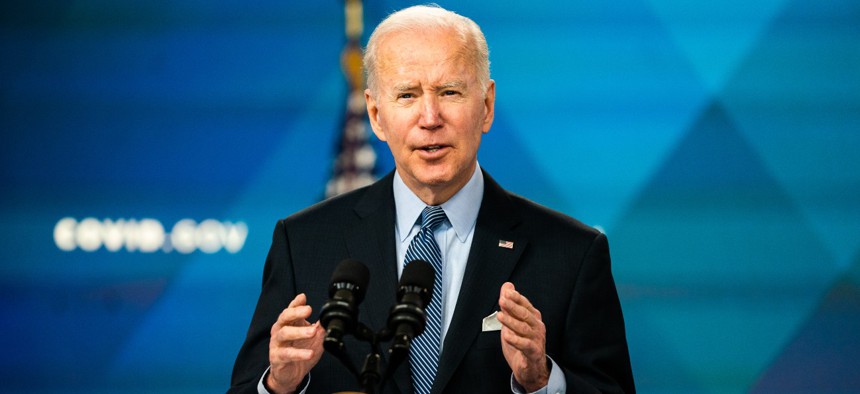
Demetrius Freeman/The Washington Post via Getty Images
The White House is Expanding its ‘Whole-of-Government’ Approach to Long COVID
In the United States, 7.7 million to 23 million people could have developed long COVID as of February 2022.
The White House announced on Tuesday it’s furthering its “whole-of-government” approach to treating long COVID, which could be affecting millions of Americans.
President Biden issued a presidential memorandum directing the Health and Human Services secretary to coordinate a new initiative across the federal government to work on the first national research action plan on long COVID. The Centers for Disease Control and Prevention defines “post-covid conditions” or “long COVID” as new, ongoing or returning health issues four weeks or more after being infected with COVID-19, which can come in different combinations for different periods of time.
“The effort will advance progress in prevention, diagnosis, treatment, and provision of services, supports, and interventions for individuals experiencing long COVID and associated conditions,” said a fact sheet from the White House. “The presidential memorandum also directs HHS to issue a report outlining services and support across federal agencies to assist people experiencing long COVID, individuals who are dealing with a COVID-related loss, and people who are experiencing mental health and substance use issues related to the pandemic.”
The report will address the effects of long COVID on high-risk communities and efforts to remedy disparities in their access to services.
Studies in the United States have estimated that 10% to 30% of COVID-19 survivors develop long COVID, so 7.7 million to 23 million people in the United States could have developed long COVID as of February 2022, the Government Accountability Office said in a report.
Separately, the Brookings Institution calculated in January that “under reasonable assumptions given the data available, long COVID could account for 15% of the nation’s 10.6 million unfilled jobs,” which is shown by the chart below:

Tuesday’s announcement “accelerates [the] whole–of-government” effort to addressing long COVID by building on the administration’s efforts to implement the recommendations of the Presidential COVID-19 Health Equity Task Force, which was established by an executive order Biden issued the day after his inauguration, as well as other actions the administration is taking, said the White House.
For example, 18 Veterans Affairs Department facilities have established long COVID care programs and the VA plans to add more; the Social Security Administration is continually updating and clarifying its guidance its policies and programs to better support individuals experiencing long COVID; and the administration is encouraging increases in health insurance coverage for long COVID care (such as for Federal Employees Health Benefit program carriers).
Additionally, Biden’s budget request for fiscal 2023, which he sent to Congress last week, includes $25 million for the CDC and $20 million for the Agency for Healthcare Research and Quality to study long COVID, which builds on the investments agencies have already made in it.
Dr. Francis Collins, then-director of the National Institutes of Health, told Government Executive in March 2021 that looking at the long-term health effects of COVID-19, “is going to be all hands on deck in a pretty unprecedented large-scale cohort analysis to get answers to this vexing problem. “







